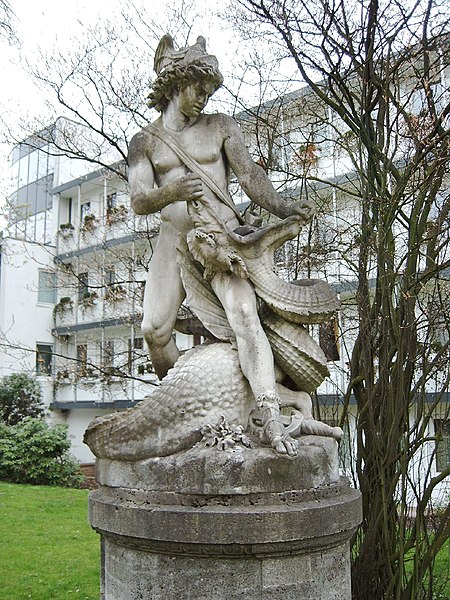At the beginning of September, I began to draft a post entitled: "
Europe needs a benevolent leader.... The unchristian, heartless Merkel government does NOT fit the bill ! " I wrote the first three paragraphs while watching the US National Democratic Convention, then interrupted the post due to a leaked letter from the Troika to the Greek government and the return of the Troika inspection team to Greece, events that provoked my last three posts: "
Non-Sense Economics and the Deepening Greek Crisis", "
A Manifesto for Economic Sense", and "
The Blueprint for Labor Reforms in Greece: Germany's Agenda 2010" on September 12.
Only then did I discover Mr. Soros' article of Sept. 7, "
The Tragedy of the European Union and How to Resolve It" in which he argues that, to save the euro, Germany would either have to decide to become a benevolent leader or leave the eurozone. While I don't agree with the latter part of Mr. Soros' argument (Germany cannot be forced to leave the eurozone and will never do so voluntarily), I fully share his view that Europe needs a benevolent leader to end the unnecessary human suffering in the Southern periphery. I think that, in addition to the ability to feel compassion toward fellow Europeans, this leader would have to be a competent and undogmatic economic policy maker so as to avoid the non-sensical economic policies based on ideology and the interests of a small elite. If Germany isn't up to this task, Europe may have to look for other alternatives.
Where can Europe find a benevolent and competent leader ?
While watching the party convention of the US Democrats I could not help but feel envious that, despite all the nutcases in US politics (mostly found among the Republicans), in US finance, and among the general populace, the country still produces some of the most charismatic, engaging politicians who combine a sharp mind with a good heart, genuinely caring for the fate of their compatriots. And to top it off, they look great in a suit ! Obviously, I'm talking about Bill Clinton and Barack Obama. I can hear the doubters say, "that's all show but no substance." Excuse me, but wasn't it Bill Clinton's policies that produced the longest economic expansion in US history, created a record number of jobs, stabilized the finances of the US social security system, and eliminated the budget deficit of the US government ? (see my post "
How to raise public revenues, reduce public debt, and stimulate job-creating growth.")
Germany, on the other hand, seems to produce mostly politicians who combine all the worst character traits: incompetence and/or ignorance, arrogance and elitism, dullness and rudeness. And on top of this, many German politicians (especially some of the so-called
christian democrats and
christian 'socialists' - CDU and CSU) display a condescending and heartless attitude toward the peoples of Southern Europe.... Is it the fundamentally undemocratic nature of our party system that produces these types of politicians ? Career-driven, loyal party bureaucrats who don't truly care about the.people they serve ? Who are neither tested for their competence (as in US debates) nor for their empathy for the lifes of ordinary citizens, yet are appointed to important leadership posts mainly on the basis of their connections ? In their arrogance, they ignore the fact that Germany's political and economic power in Europe and the world rests on the hard work, creativity and ingenuity of its people and that it is these very people who can take the power away from politicians in a heartbeat, if and when they realize and put into action these simple words: "
Wir sind das Volk" - "
We are the People".
Germans are not quite there yet, as the majority does not (yet) feel the economic pain of the Southern European periphery. Also, the German corporate and banks/ter 'elite', in cahoots with the Bertelsmann & Springer media empires, has been very successful in indoctrinating citizens with their market-fundamentalist, supply-side ideology of austerity. Even German academics and intellectuels in this land of Dichter und Denker (poets and thinkers) have succumbed to the neo-liberal dogma which is still being propagated every day in the popular tabloid BILD, read by many high-level employees (as can be observed every morning in first-class ICE seating sections).
So successful has been this indoctrination that the majority of the German citizenry continues to assume (as reflected in the Maastricht Treaty) that only the public sector can produce chronic deficits and that the euro crisis was caused by public overspending and overborrowing. And so, they follow the
Schwabian housewife model of hard work, modesty and thriftiness, sacrificing wage increases and improvements in living standards for the well-being of a small 'elite', while blaming the suffering Southern Europeans for the euro crisis. It will take many years to repair the social and political damage this conservative German 'elite' has imposed on the eurozone, seriously endangering peace and security in Western Europe.
There are, however, progressive individuals and groups in Germany who vehemently oppose the unfair and economically idiotic austerity policies imposed on our Southern European friends and are actively working on alternative economic strategies. Also, thanks in part to articles and blogs by nobel prize winning US economists Paul Krugmann and Joseph Stiglitz, German economists Albrecht Müller, Heiner Flassbeck and Sven Giegold, financier George Soros and others, more and more people in Germany (yet, by far not enough) are beginning to comprehend the nexus of interests dominating economic policy making in Europe. Yet, from comprehension to active opposition, whether on the streets or at the ballot box in next year's parliamentary election, is a difficult and slow process in Germany. Still, now that Mario Draghi and his Big Bazooka have achieved a (temporary ?) monetary salvation of the eurozone, the time gained should be used for a U-turn in macroeconomic policies, away from the debt-deflationary austerity toward a more benevolent, growth- and employment-enhancing recovery path in the eurozone.
However, the hundert thousand dollar question is:
Does Germany have a benevolent leader with the courage and audacity to implement demand-side policies against the interests of the corporate and banks/ter elite?
Looking at current
opinion polls for the next parliamentary election in Germany (Sept 2013), the situation seems less than hopeful for anti-austerians: chandellor Merkel's CDU continues to ride high in the polls and the opposition social democrats (with the second highest poll ratings) so far have not come forward with a chancellor candidate who is immune to the neo-liberal Zeitgeist [1], or who has the ability to free himself completely from this doctrine and think outside of the box. The same is true for the old guard of the Greens, the party with the third highest poll ratings. The remaining smaller parties, garnering between 4% and 8% in the polls, include the Linke (the only party that has continuously proposed policies to reinstate the deconstructed public pension and unemployment insurance system and protect the weakest in German society), the new and unpredictable German man's party (better known as the pirate party), and the free democrats who might not make it into parliament at all. So, knowing the Angst-ridden Germans, they will probably support a party combination that seems safe: either Merkel's CDU + the conservative wing of the social democrats, or Merkel's CDU + the conservative wing of the Greens. Both combinations would mean a continuation of the current austerity policies for Europe, albeit with a stronger focus on investments and growth.
The progressive groups mentioned above include people from the left wing of the social democrats and the Greens who, unfortunately, do not (yet) have the popular or financial support to push through a U-turn in economic policies this time around. However, Mr. Soros' and others' support could help educate the German populace about the true interests behind the policies of Germany's 'elite', the corporate welfare payments to European banks financed by taxpayers, and other 'ongoings' the corporate elite doesn't want the German citizenry to know about. Such support for regular public education is absolutely necessary as there are efforts underway to prepare the terrain for the next round of the neo-liberal policy agenda, including cuts in pensions, cuts in transfer payments for families and the unemployed, labor market liberalization, privatizations, and new restrictions on public expenses which would completely eliminate any discretionary spending by democratically elected representatives and further impoverish the public sector:
Agenda 2020.
Is there an alternative to German leadership in the eurozone ?
I believe there is ! Mario Draghi has shown that, with the confidence that comes from economic competence and many years of experience in leadership positions on a national and international level, the Very Serious People of Germany can be cornered and their policies exposed as selfish, backward, and in some cases even psychotic. However, this is possible only with the backing of a large enough group of other eurozone nations and the courage to stand up against powerful German officials. The aim is not to 'gang up' against Germany, but to protect Europe (including the majority of the German population) from unnecessarily austere and destructive economic policies that serve only a small elite, but are unworthy of a rich continent with sufficient financial resources to provide a comfortable standard of living for every one of its citizens.
Europeans do not want a German Europe, but a European Germany !
(written by a committed European born and raised in West-Germany)
-----------------------------------------------------------
[1] Mr. Steinbrueck, one of the possible social democratic candidates for chancelor, was asked in a recent interview why he had supported the liberalization of the German finance sector during his time as finance minister and responded that his actions were part of the Zeitgeist then. The question for me is: "Would I, as a German citizen, want a chancelor who follows the Zeitgeist or one who will question the Zeitgeist and make a decision based on what's best for the German people?" I think, the answer is obvious.





 I just wish Obama had thought more about the hopes and dreams of ordinary Americans, rather than the hopes and dreams of American banks/ters.
I just wish Obama had thought more about the hopes and dreams of ordinary Americans, rather than the hopes and dreams of American banks/ters.




